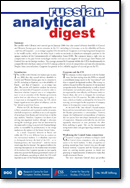Ukrainian-Russian Relations After Kyiv's Presidential Election

Author(s): André Härtel
Editor(s): Stephen Aris, Matthias Neumann, Robert Orttung, Jeronim Perovic, Heiko Pleines, Hans-Henning Schröder
Series: Russian Analytical Digest (RAD)
Issue: 75
Pages: 2-5
Publisher(s): Center for Security Studies (CSS), ETH Zurich; Research Centre for East European Studies, University of Bremen; Institute of History, University of Basel
Publication Year: 2010
